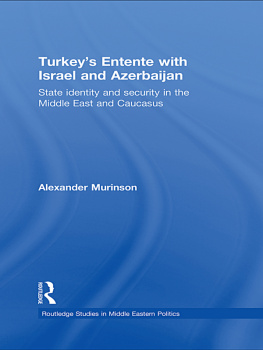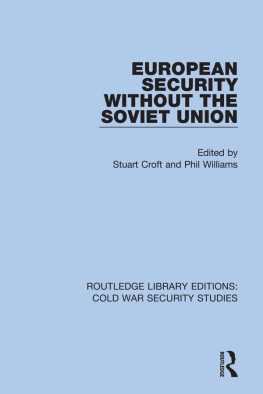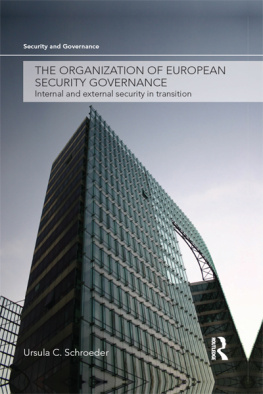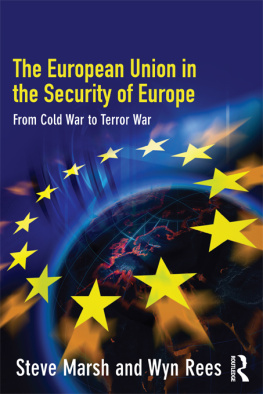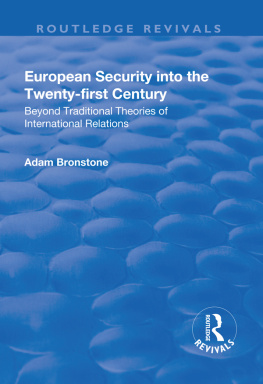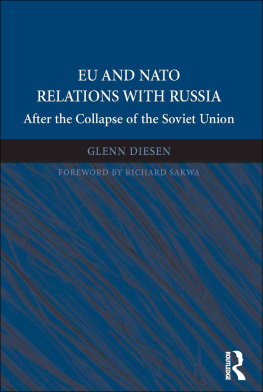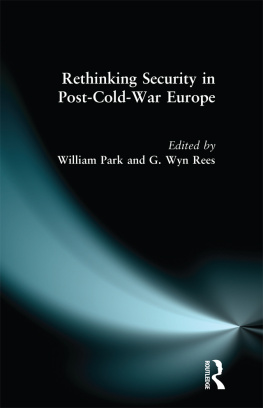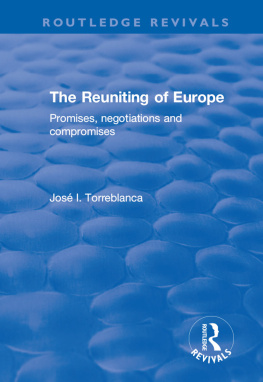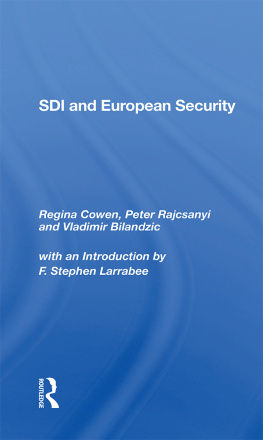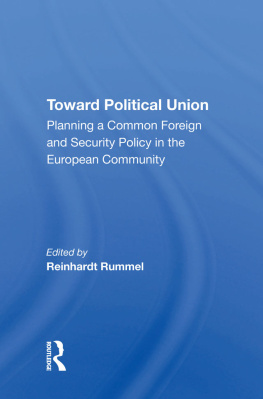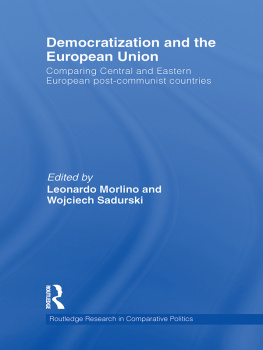ROUTLEDGE LIBRARY EDITIONS: COLD WAR SECURITY STUDIES
Volume 10
CENTRAL EUROPEAN SECURITY CONCERNS
First published in 1993 by Frank Cass & Co. Ltd.
This edition first published in 2021
by Routledge
2 Park Square, Milton Park, Abingdon, Oxon OX14 4RN
and by Routledge
52 Vanderbilt Avenue, New York, NY 10017
Routledge is an imprint of the Taylor & Francis Group, an informa business
1993 Frank Cass & Co. Ltd.
All rights reserved. No part of this book may be reprinted or reproduced or utilised in any form or by any electronic, mechanical, or other means, now known or hereafter invented, including photocopying and recording, or in any information storage or retrieval system, without permission in writing from the publishers.
Trademark notice: Product or corporate names may be trademarks or registered trademarks, and are used only for identification and explanation without intent to infringe.
British Library Cataloguing in Publication Data
A catalogue record for this book is available from the British Library
ISBN: 978-0-367-56630-2 (Set)
ISBN: 978-1-00-312438-2 (Set) (ebk)
ISBN: 978-0-367-61214-6 (Volume 10) (hbk)
ISBN: 978-1-00-310468-1 (Volume 10) (ebk)
Publishers Note
The publisher has gone to great lengths to ensure the quality of this reprint but points out that some imperfections in the original copies may be apparent.
Disclaimer
The publisher has made every effort to trace copyright holders and would welcome correspondence from those they have been unable to trace.
CENTRAL EUROPEAN SECURITY CONCERNS:
BRIDGE, BUFFER OR BARRIER?
Edited by
JACOB KIPP
First published in 1993 in Great Britain by
FRANK CASS & CO. LTD.
Gainsborough House, 11 Gainsborough Road,
London E11 1RS, England
and the United States of America by
FRANK CASS & CO. LTD.
c/o International Specialized Book Services, Inc.
5804 N.E. Hassalo Street, Portland, Oregon 97213-3644
Copyright 1993 Frank Cass & Co. Ltd.
British Library Cataloguing in Publication Data
Central European Security Concerns: Bridge,
Buffer or Barrier? (Special Issue of
the Journal European Security, ISSN
0966-2839; Vol.1, No.4)
I. Kipp, Jacob W.II. Series
327.1
ISBN 0-7146-4545-1
Library of Congress Cataloging-in-Publication Data
Applied for, a Catalog record for this book will be available from the Library of Congress.
This group of studies first appeared in a special issue on Central European Security Concerns: Bridge, Buffer or Barrier? in European Security Vol.1, No.4 (Winter 1992) published by Frank Cass & Co. Ltd.
All rights reserved. No part of this publication may be reproduced stored in a retrieval system or transmitted in any form or by any means, electronic, mechanical, photocopying, recording or otherwise, without the prior permission of Frank Cass and Co. Ltd.
Printed in Great Britain by Antony Rowe Ltd.
Contents
Lszl Valki
Central Europe and the Post-Cold War European Security Order Theodor Winkler
Facing the Legacy of Post-Stalinist Regimes Andrzej Korbonski
Military Security in the Post-Communist Age: Reflections on Myths and Misperceptions Ivan Volgyes
Central European Security: A View from Moscow Alexander Konovalov
Disintegration of the USSR and Central European Security: A Polish View Antoni Kamiski and Lech Kociuk
Dj Vu All Over Again? Polands Attempt to Avoid Entrapment Between Two Belligerents Joshua Spero
East-Central Europe and the Czech and Slovak Republics in a New Security Environment Vasil Hudak
International Ramifications of Yugoslavias Serial Wars: The Challenge of Ethno-National Conflicts for a Post-Cold War European Order Jacob Kipp and Timothy Thomas
- Central Europe and the Post-Cold War European Security Order
- Facing the Legacy of Post-Stalinist Regimes
- Military Security in the Post-Communist Age: Reflections on Myths and Misperceptions
- Central European Security: A View from Moscow
- Disintegration of the USSR and Central European Security: A Polish View
- Dj Vu All Over Again? Polands Attempt to Avoid Entrapment Between Two Belligerents
- East-Central Europe and the Czech and Slovak Republics in a New Security Environment
- International Ramifications of Yugoslavias Serial Wars: The Challenge of Ethno-National Conflicts for a Post-Cold War European Order
Guide
LSZL VALKI
NEW UNCERTAINTIES IN CENTRAL EUROPE
Even after the withdrawal of Soviet troops and the dissolution of the Soviet Union the new Central European democracies do perceive some threats or potential dangers, although it would be rather difficult to identify them.
In fact, even the past threats are difficult to identify. On the Eastern part, most nations in the region did not perceive any real threat posed by NATO. More precisely, the threat has been somehow functional. Many people feared that, say, in an emerging conflict between the United States and the Soviet Union the latter might make a wrong move and, as a consequence, the whole military machine would come into motion on both sides. Such a situation would have been especially dangerous for the Central European countries, since the western missiles were obviously targeted at their cities and military bases. In this functional sense, some sort of threat has been perceived in eastern military circles, because they knew something about the precision of western targeting devices.
Apart from that, for a Central European country, the genuine threat has been posed primarily by its own military alliance, and not by NATO. The Berlin blockade of 1948-49, the construction of the Berlin Wall in 1961, the use of force against Poland and Hungary in 1956, against Czechoslovakia in 1968, the crisis in Poland threatening with Soviet military intervention from 1980 onwards and the long-standing occupation of East Germany, Poland, Hungary, later Czechoslovakia, have shown these nations that the question Whence the threat? cannot be answered in the obligatory way.
That is why it is so ridiculous to use the terms security and stability in connection with the bipolar world. This world has been, of course, to a certain degree secure and stable for the West. The Western alliance and its deterrence has worked, but it was historically sheer luck that no fatal mistakes had been made during four decades by the superpowers. The other historical luck was that the Soviet leadership succeded in maintaining its power for the same period in all Warsaw Treaty Organization countries, whether occupied or not. Although the socialist camp fell from one crisis into another, no fatal mistakes were made in their management, either.
It is exactly the same reason why one could not speak about security and stability in the East until the Brezhnev doctrine was renounced by Gorbachev, except if somebody would look upon maximum security labour camps as very stable systems of human society. It is a contradiction in terms to refer to an occupied country or a country under foreign rule as being in a secure and stable position. (Interestingly enough, the most stable state became Hungary, after its 1956 revolution had brutally been suppressed and Jnos Kdr turned the ruthless Bolshevik dictatorship into a consolidated, authoritarian regime.)


